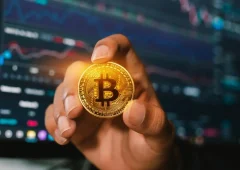Is Bitcoin Losing Correlation With Traditional Markets?
16.08.2024 14:30 1 min. read Alexander StefanovEconomist Peter Schiff has highlighted Bitcoin's (BTC/USD) divergence from other risk assets as the leading cryptocurrency has seen a significant decline while stock markets have risen.
Schiff commented on Bitcoin’s sudden drop of over 5% in a short period of time. This sharp drop occurred simultaneously with the stock market rally, where the S&P 500 closed 1.61% higher at 5,543.22 and the tech-heavy Nasdaq Composite rose 2.34%, ending at 17,594.50.
The economist contrasted Bitcoin’ s decline with gold’s performance, noting that while gold initially pulled back, it later reversed direction and finished with gains. He noted that gold’s gains could have been more significant had investors not misinterpreted the day’s economic data.
Over the past month, Bitcoin has shown a growing correlation with the stock markets. According to The Block, its 30-day Pearson correlation coefficient with the S&P 500 has increased to 0.28, up from -0.81 in the previous month.
The correlation coefficient measures the strength of the relationship between two variables. A positive correlation coefficient indicates that the two variables are moving in the same direction – if stocks are rising, Bitcoin is rising and vice versa – while a negative correlation indicates the opposite.
Similarly, Bitcoin’s correlation with the Nasdaq Composite strengthened, with the ratio rising to 0.13 from -0.83 a month earlier.
-
1
Blockchain Group Bets Big on Bitcoin With Bold €300M Equity Deal
09.06.2025 22:00 2 min. read -
2
Bitcoin to Track Global Economy, Not Dollars, Says Crypto Expert
09.06.2025 18:00 2 min. read -
3
BlackRock’s Bitcoin ETF Breaks Into Top 15 Most Traded ETFs of 2025
12.06.2025 18:00 2 min. read -
4
Bitcoin on a Path to $1 Million as Wall Street Embraces Digital Gold – Mike Novogratz
14.06.2025 19:00 1 min. read -
5
Bank of America Compares Bitcoin to History’s Most Disruptive Inventions
17.06.2025 14:00 1 min. read
Bitcoin Averages 37% Rebound After Crises, Binance Research Finds
Despite common fears that global crises spell disaster for crypto markets, new data from Binance Research suggests the opposite may be true — at least for Bitcoin.
Bitcoin Mining Faces Profit Crunch, But No Panic Selling
A new report by crypto analytics firm Alphractal reveals that Bitcoin miners are facing some of the lowest profitability levels in over a decade — yet have shown little sign of capitulation.
Bitcoin Hashrate Declines 3.5%, But Miners Hold Firm Amid Market Weakness
Bitcoin’s network hashrate has fallen 3.5% since mid-June, marking the sharpest decline in computing power since July 2024.
Bitcoin Surpasses Alphabet (Google) to Become 6th Most Valuable Asset Globally
Bitcoin has officially overtaken Alphabet (Google’s parent company) in global asset rankings, becoming the sixth most valuable asset in the world, according to the latest real-time market data.
-
1
Blockchain Group Bets Big on Bitcoin With Bold €300M Equity Deal
09.06.2025 22:00 2 min. read -
2
Bitcoin to Track Global Economy, Not Dollars, Says Crypto Expert
09.06.2025 18:00 2 min. read -
3
BlackRock’s Bitcoin ETF Breaks Into Top 15 Most Traded ETFs of 2025
12.06.2025 18:00 2 min. read -
4
Bitcoin on a Path to $1 Million as Wall Street Embraces Digital Gold – Mike Novogratz
14.06.2025 19:00 1 min. read -
5
Bank of America Compares Bitcoin to History’s Most Disruptive Inventions
17.06.2025 14:00 1 min. read


